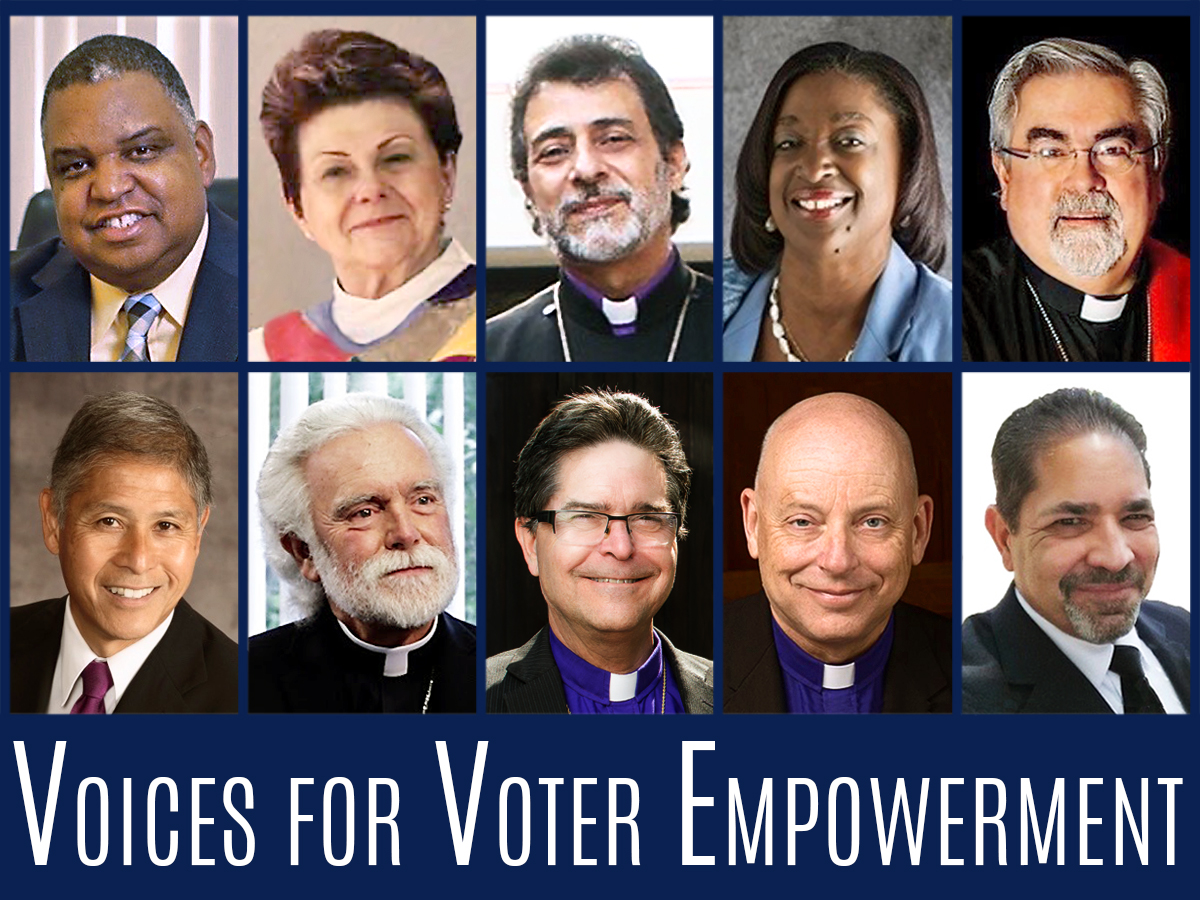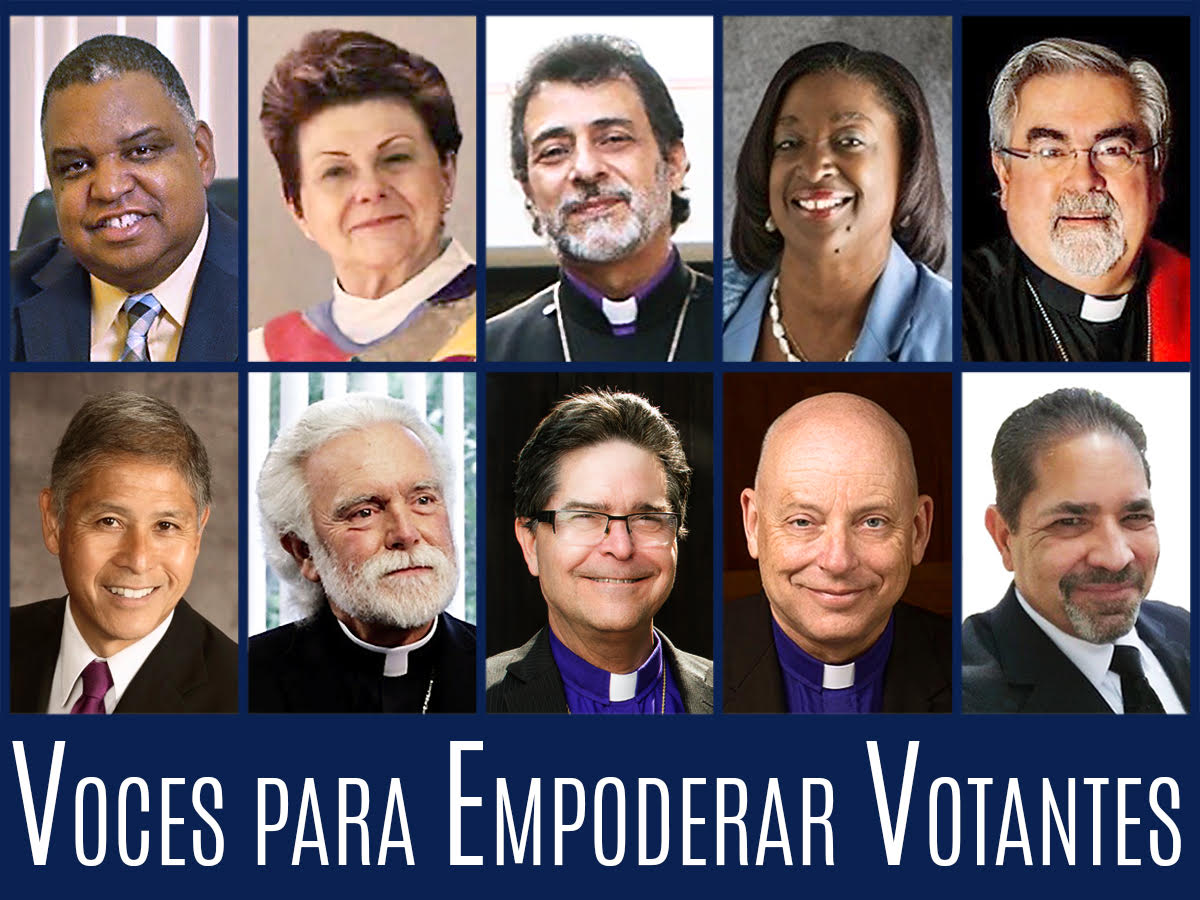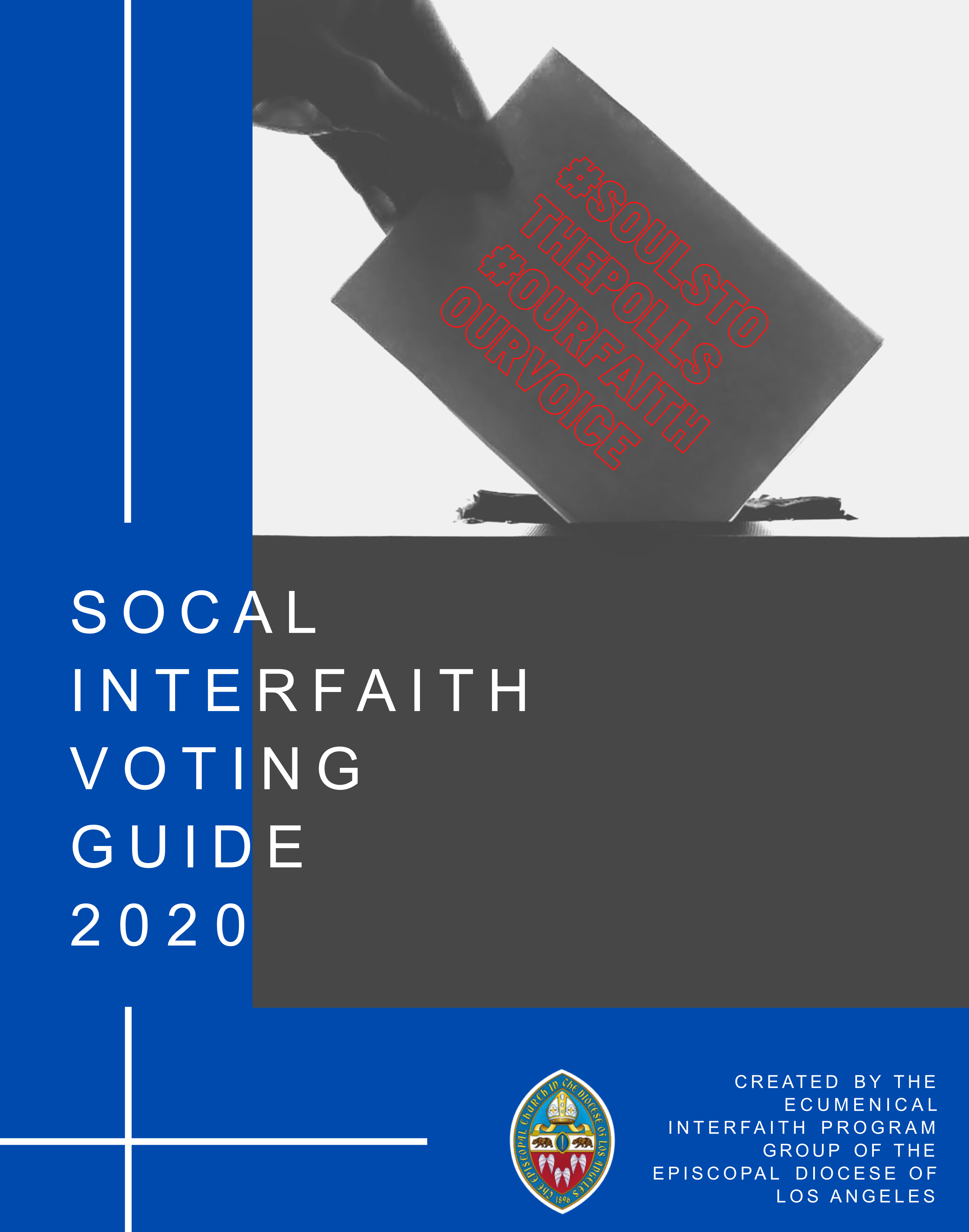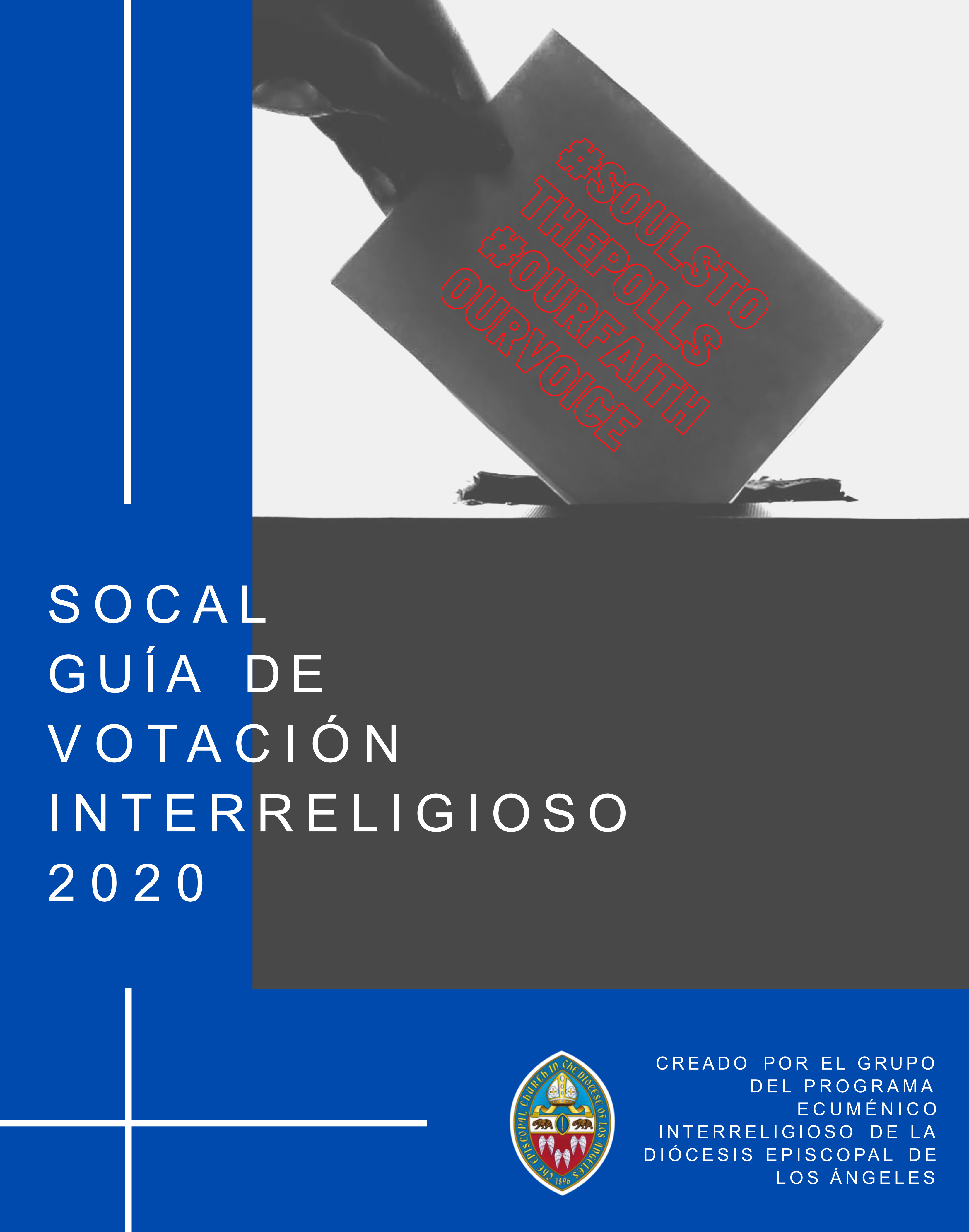Voter Empowerment
| Bishop John Harvey Taylor on Voting

| Voting For Our Neighbor’s Sake: An Ecumenical Call to Civic Engagement
July 27, 2020
Even as we believe that a Christian’s eternal citizenship is in heaven, as Christians we live out our temporal lives in this world, and it is in this life—and this world—that we are called by Christ to worship God and serve our neighbor. In the branches of the Western Christian tradition our churches represent, there has always been a strong intersection between the spiritual call of the church to conduct worship and promote faithfulness and ethical conduct among believers, and our belief in the duty of temporal government to use public power and civil law to promote justice and the welfare of all.
In slightly varying ways, our churches have each taught that civic engagement—good citizenship—is the duty of every Christian. While our churches have not always approached the question in the same way, and none of our traditions has been static, in the pluralistic and democratic American context all of our churches have advocated strongly for our members to be actively engaged, and to avail themselves of the rights of citizenship, particularly by participating in elections. At the same time, for the most part our churches have avoided conscious identification with particular political parties or direct endorsement of individual candidates, maintaining respect for our members’ right to vote as their consciences direct.
That we are non-partisan, however, does not mean that we have been disengaged from the issues and policies that impact the neighborhoods where our local congregations are found. In various ways and at different times, each of our churches has advocated for measures that have improved the welfare and health of society; all of our churches have advocated for greater justice for those disadvantaged and disenfranchised by prejudice, whether religious, racial, or ethnic. We have advocated for our own members and we have fought for the rights of others. In this political engagement we feel we live out our gospel call to honor God and serve our neighbor.
Over time, each of our churches has expressed specific ideas of what our vote for the neighbor’s sake might entail: expanding civil rights and racial equity; more compassionate immigration and refugee policies; expanded health care; compassion toward those suffering homelessness—these are all issues that cut across communities and our churches, but which we have promoted to our people in the past. Our churches have used social statements, pastoral letters, action alerts, and joint statements by our bishops to define what we believe most important in each generation and in each election. We have particular issues important to each of us; we have different ways of defining our theological approaches to issues. But this we have in common: the desire to be agents for the improvement of our society to the betterment of its citizens.
As bishops and leaders of historic Christian churches in the United States of America, and for the Los Angeles area, we believe that all the people of our churches should use the privilege of the vote in national, state, and local elections. We are deeply committed to our people’s right to vote, and we believe any efforts to limit voting or make it more difficult are improper and misguided, and disadvantage the very people we feel most obligated to defend. Indeed, in the wake of events that have galvanized the nation following the May 25 death of George Floyd, it is even more important to assure that all voices are heard, especially those of the marginalized. We do this for their sake, and for everyone’s sake, in order to form a more complete and therefore more perfect union.
Further, though we want our people to vote as they believe, we want them also to understand that voting is a way of living out the principle of loving our neighbor as ourselves. We should vote not just in our self-interest, but in ways that benefit and —above all—do not harm our neighbor. For what does it profit us as a community, to benefit ourselves at our neighbors’ expense? Citizenship exercised in a Christian way considers the welfare of others as much as our own. This is not a view we often hear expressed in our political discourse, but it is central to us—and we wish to lift it up not only to our own people, but to the community as a whole.
Faithfully,
The Rev. John Cager
Pastor, Ward A.M.E. Church & President, Los Angeles Council of Religious Leaders
The Rev. Linda L. Culbertson
General Presbyter, Presbytery of the Pacific
His Eminence, Archbishop Hovnan Derderian
Primate, Western Diocese of the Armenian Church
Jacquelyn Dupont-Walker
Director, Social Action Commission, A.M.E. Church
Bishop R. Guy Erwin
Southwest California Synod, Evangelical Lutheran Church in America
Bishop Grant Hagiya
California-Pacific Conference, United Methodist Church
Rt. Rev. Alexei Smith
Ecumenical Officer, Archdiocese of Los Angeles
Bishop Andrew A. Taylor
Pacifica Synod, Evangelical Lutheran Church in America
The Rt. Rev. John Harvey Taylor
Bishop, Episcopal Diocese of Los Angeles
Rev. Dr. Felix C. Villanueva
Conference Minister, So. Calif. Nevada Conference, United Church of Christ
(Signatories are pictured from left to right, beginning with top row, alphabetically by surname.)
To share this message, click here.

| Votando Por El Bien De Nuestro Prójimo: Un Llamado Ecuménico a la Participación Cívica
July 27, 2020
Aún cuando creemos que la ciudadanía eterna de un cristiano está en el cielo, como cristianos vivimos nuestra vida temporal en este mundo, y es en esta vida —y en este mundo— que Cristo nos llama a adorar a Dios y servir a nuestro prójimo. En las ramas de la tradición cristiana occidental que representan nuestras iglesias, siempre ha habido una fuerte intersección entre el llamado espiritual de la iglesia para llevar a cabo el culto y promover la fidelidad y la conducta ética entre los creyentes, y nuestra creencia en el deber del gobierno temporal de utilizar el poder público y el derecho civil para promover la justicia y el bienestar para todos.
De maneras ligeramente diversas, cada una de nuestras iglesias ha enseñado que el compromiso cívico —buena ciudadanía— es el deber de todo cristiano. Si bien nuestras iglesias no siempre han abordado el asunto de la misma manera, y ninguna de nuestras tradiciones ha permanecido estática, en el contexto pluralista y democrático de América todas nuestras iglesias han abogado firmemente para que nuestros miembros participen activamente y se beneficien de los derechos de ciudadanía, particularmente participando en las elecciones. Al mismo tiempo, en su mayor parte nuestras iglesias han evitado la identificación consciente con determinados partidos políticos o la aprobación directa de candidatos individuales, manteniendo el respeto por el derecho de nuestros miembros de votar como se los dicte su conciencia.
Sin embargo, el que no seamos partidistas no significa que nos hayamos desvinculado de los problemas y políticas que afectan a los barrios donde se encuentran nuestras congregaciones locales. De diversas maneras y en diferentes momentos, cada una de nuestras iglesias ha abogado por medidas que han mejorado el bienestar y la salud de la sociedad; todas nuestras iglesias han abogado por una mayor justicia para los desfavorecidos y los privados de sus derechos a causa de prejuicios, ya sean religiosos, raciales o étnicos. Hemos abogado por nuestros propios miembros y hemos luchado por los derechos de los demás. En este compromiso político sentimos que vivimos nuestro llamado del evangelio a honrar a Dios y servir a nuestro prójimo.
Con el tiempo, cada una de nuestras iglesias ha expresado ideas específicas de lo que nuestro voto por el bien del prójimo podría implicar: ampliar los derechos civiles y la equidad racial; políticas de inmigración y refugiados más compasivas; atención médica ampliada; compasión hacia aquellos que sufren desamparo, todos estos son temas que se encuentran en las comunidades y en nuestras iglesias, y que hemos promovido a nuestra gente en el pasado. Nuestras iglesias han hecho declaraciones sociales, cartas pastorales, alertas de acción y declaraciones conjuntas de nuestros obispos para definir lo que creemos es más importante en cada generación y en cada elección. Tenemos problemas particulares importantes para cada uno de nosotros; tenemos diferentes formas de definir nuestros enfoques teológicos a los problemas. Pero esto tenemos en común: el deseo de ser agentes para la mejora de nuestra sociedad, para el mejoramiento de sus ciudadanos.
Como obispos y líderes de iglesias cristianas históricas en los Estados Unidos de América, y en el área de Los Ángeles, creemos que toda la gente de nuestras iglesias debe usar el privilegio del voto en las elecciones nacionales, estatales y locales. Estamos profundamente comprometidos con el derecho de nuestro pueblo a votar, y creemos que cualquier esfuerzo por limitar el voto o hacerlo más difícil es inapropiado y equivocado, y desfavorece a las mismas personas que nos sentimos más obligados a defender. De hecho, a raíz de los acontecimientos que han galvanizado a la nación tras la muerte el 25 de mayo de George Floyd, es aún más importante asegurar que todas las voces sean escuchadas, especialmente las de los marginados. Lo hacemos por su bien, y por el bien de todos, para formar una unión más completa y, por lo tanto, más perfecta.
Aún más, aunque queremos que nuestra gente vote como cree, queremos que también entiendan que votar es una forma de vivir el principio de amar a nuestro prójimo como a nosotros mismos. Debemos votar no sólo por nuestro propio interés, sino en formas que beneficien y, sobre todo, no dañen a nuestro prójimo. ¿Cuál es el valor como comunidad el beneficiarnos a expensas de nuestros vecinos? La ciudadanía ejercida de manera cristiana considera el bienestar de los demás tanto como el nuestro. Este no es un punto de vista que a menudo escuchamos expresado en nuestro discursos políticos, pero es fundamental para nosotros, y queremos elevarlo no sólo a nuestro propio pueblo, sino a la comunidad en su conjunto.
Fielmente,
El Rev. John Cager
Pastor, Guardián de la Iglesia A.M.E. & Presidente, Concilio de Líderes Religiosos de Los Ángeles
La Rev. Linda L. Culbertson
Presbítera General, Presbiterio del Pacífico
Su Eminencia, Arzobispo Hovnan Derderian
Primado, Diócesis Occidental de la Iglesia Armenia
Jacquelyn Dupont-Walker
Director, Commission de Acción Social, Iglesia A.M.E.
Obispo R. Guy Erwin
Sínodo del Suroeste de California, Iglesia Evangélica Luterana de América
Obispo Grant Hagiya
Conferencia California-Pacífico, Iglesia Metodista Unida
Reverendísimo Alexei Smith
Oficial Ecuménico, Arquidiócesis de Los Ángeles
Obispo Andrew A. Taylor
Sínodo Pacifica, Iglesia Evangélica Luterana en América
El Reverendísimo John Harvey Taylor
Obispo, Diócesis Episcopal de los Ángeles
Rev. Dr. Felix C. Villanueva
Ministro de Conferencia, Conferencia Sur de California-Nevada, Iglesia Unida de Cristo
(Los firmantes aparecen de izquierda a derecha, comenzando por la fila superior, alfabéticamente por apellido.)
Para compartir este mensaje, haga clic aquí.


